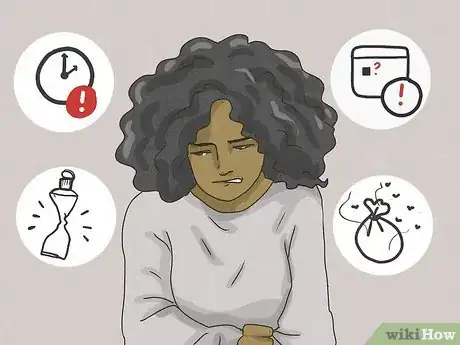This article was co-authored by Christy Irvine, PhD and by wikiHow staff writer, Hannah Madden. Dr. Christy Irvine is a Licensed Clinical Psychologist and the owner of her private practice out of Portland, Oregon. With over 10 years of experience, she specializes in individual and couples therapy using various techniques including Emotionally Focused Therapy (EFT), Acceptance and Commitment Therapy (ACT), Interpersonal-Process Therapy, and Cognitive Processing Therapy (CPT). Dr. Irvine holds a B.A. in Psychology from Whitman College and a Ph.D. in Clinical Psychology from The University of Connecticut.
This article has been viewed 12,071 times.
When your partner experiences a lot of anger, it can be tough to deal with—especially if that anger is directed at you. If you don’t have the skills to deal with an angry partner, their feelings can cause a lot of resentment over time. Keep reading to learn how you can handle your partner’s anger and deal with them effectively to change your relationship for the better.
Steps
Community Q&A
-
QuestionHow do you deal with anger in a relationship?
 Christy Irvine, PhDDr. Christy Irvine is a Licensed Clinical Psychologist and the owner of her private practice out of Portland, Oregon. With over 10 years of experience, she specializes in individual and couples therapy using various techniques including Emotionally Focused Therapy (EFT), Acceptance and Commitment Therapy (ACT), Interpersonal-Process Therapy, and Cognitive Processing Therapy (CPT). Dr. Irvine holds a B.A. in Psychology from Whitman College and a Ph.D. in Clinical Psychology from The University of Connecticut.
Christy Irvine, PhDDr. Christy Irvine is a Licensed Clinical Psychologist and the owner of her private practice out of Portland, Oregon. With over 10 years of experience, she specializes in individual and couples therapy using various techniques including Emotionally Focused Therapy (EFT), Acceptance and Commitment Therapy (ACT), Interpersonal-Process Therapy, and Cognitive Processing Therapy (CPT). Dr. Irvine holds a B.A. in Psychology from Whitman College and a Ph.D. in Clinical Psychology from The University of Connecticut.
Licensed Clinical Psychologist It can be really hard, but try to be empathetic to your partner's feelings even if you don't like their behavior. However, it's also important to let them know if they cross a line and do or say something that's inappropriate or harmful.
It can be really hard, but try to be empathetic to your partner's feelings even if you don't like their behavior. However, it's also important to let them know if they cross a line and do or say something that's inappropriate or harmful. -
QuestionHow do you respond to an angry husband?
 Christy Irvine, PhDDr. Christy Irvine is a Licensed Clinical Psychologist and the owner of her private practice out of Portland, Oregon. With over 10 years of experience, she specializes in individual and couples therapy using various techniques including Emotionally Focused Therapy (EFT), Acceptance and Commitment Therapy (ACT), Interpersonal-Process Therapy, and Cognitive Processing Therapy (CPT). Dr. Irvine holds a B.A. in Psychology from Whitman College and a Ph.D. in Clinical Psychology from The University of Connecticut.
Christy Irvine, PhDDr. Christy Irvine is a Licensed Clinical Psychologist and the owner of her private practice out of Portland, Oregon. With over 10 years of experience, she specializes in individual and couples therapy using various techniques including Emotionally Focused Therapy (EFT), Acceptance and Commitment Therapy (ACT), Interpersonal-Process Therapy, and Cognitive Processing Therapy (CPT). Dr. Irvine holds a B.A. in Psychology from Whitman College and a Ph.D. in Clinical Psychology from The University of Connecticut.
Licensed Clinical Psychologist You can ask your partner if now is a good time to talk or not. If they’re too angry, it might be better to wait until later.
You can ask your partner if now is a good time to talk or not. If they’re too angry, it might be better to wait until later.
Warnings
- If you ever feel unsafe with your partner, call emergency services right away.[14]⧼thumbs_response⧽
References
- ↑ https://www.goodtherapy.org/blog/8-strategies-for-dealing-with-angry-partner-1206165
- ↑ https://www.goodtherapy.org/blog/8-strategies-for-dealing-with-angry-partner-1206165
- ↑ https://www.psychologytoday.com/us/blog/anger-in-the-age-entitlement/200904/how-deal-angry-partner
- ↑ https://psychcentral.com/blog/how-to-switch-off-an-angry-person#4
- ↑ https://au.reachout.com/articles/when-someone-is-always-angry
- ↑ Christy Irvine, PhD. Licensed Clinical Psychologist. Expert Interview. 9 April 2021.
- ↑ https://au.reachout.com/articles/when-someone-is-always-angry
- ↑ https://www.goodtherapy.org/blog/8-strategies-for-dealing-with-angry-partner-1206165
- ↑ Christy Irvine, PhD. Licensed Clinical Psychologist. Expert Interview. 9 April 2021.
- ↑ https://www.mind.org.uk/information-support/types-of-mental-health-problems/anger/for-friends-and-family/
- ↑ https://www.mind.org.uk/information-support/types-of-mental-health-problems/anger/for-friends-and-family/
- ↑ https://au.reachout.com/articles/when-someone-is-always-angry
- ↑ https://www.mind.org.uk/information-support/types-of-mental-health-problems/anger/for-friends-and-family/
- ↑ https://www.mind.org.uk/information-support/types-of-mental-health-problems/anger/for-friends-and-family/
































































